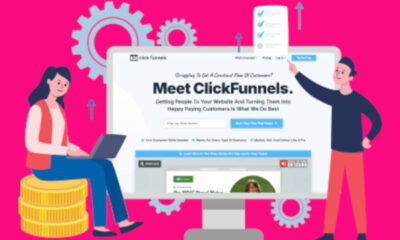Free
Affiliate Marketing: The Definitive Guide For Making Money
Wrapped in layers on a frigid December night in a Long Island neighborhood, I armored myself against the biting cold. A stark minus five degrees Fahrenheit couldn’t deter my youthful determination. Adorned in modest woolen gloves and draped with a scarf, my tiny frame was a fortress ready to brave the elements, as I embarked on a door-to-door sales quest.
Imagine the peculiar sight of a youngster at your threshold, under a wintry sky, offering magazine subscriptions. That eager child was I, armed with papers and pen, making my pitch to unsuspecting neighbors. Door by door, I pursued this venture as a proud affiliate, rewarded not only with payment but also with enticing prizes for each new sales milestone. This was my initiation into the world of sales; a prelude to my affinity for affiliate marketing — albeit in the era before the digital boom.
Reflecting upon these early endeavors, I recognize the profound impact of grassroots affiliate marketing. Before the digital age revolutionized the landscape, my door-knocking was a precursor to the practice we now see online. Be it the footsteps on your porch or the clicks on a webpage, the essence of affiliate marketing remains: representing a company’s offerings, whether as an employee or as an affiliate.
What Is Affiliate Marketing?
This narrative serves as a backdrop to understand that the age-old tradition of door-to-door selling differs little from modern online affiliate practices. At their core, each relies on an individual’s official association with a business, allowing them to generate income through the promotion of products or services. However, compensation for an affiliate is not guaranteed but rather tied to the imperative skill of selling — a craft honed through experience over theories learned from books.
How To Make Money As An Affiliate?
From my formative years, intuition quickly guided my sense of potential buyers. Frequent interactions at hundreds of doorsteps fostered insights into human nature. Fearlessly driven by the allure of monetary reward, I learned that the art of persuasion outweighed any lingering fears.
Today, while you need not traverse neighborhoods to profit as an affiliate, understanding the art of pitching and the psychological triggers influencing human behavior is essential. Whether online or face-to-face, sales fundamentally connect to intrinsic human motivations.
Key Principles for Successful Affiliate Marketing
Principle 1—Pain vs Pleasure
Rooted in their behavioral architecture, individuals instinctively skirt pain in favor of pleasure. The aversion to loss often overpowers the desire for gain, a dichotomy expounded by Tony Robbins and crucial to grasp in affiliate marketing. To generate leads and build prospect interest, an affiliate marketer must navigate this principle, leveraging the instinct to avoid distress over the pursuit of gratification.
Principle 2—The Power of Reciprocity
There’s a potent allure within the concept of ‘free,’ as countless studies have demonstrated. Be it a freebie or a minuscule cost, the former invariably garners greater traction. Far from random generosity, this strategic move taps into the power of reciprocity seen even in the commonplace practice of food samples in grocery stores.
As a young door-to-door salesman, these experiences were my unwitting introduction to eventual online ventures as an affiliate marketer. Those childhood encounters not only equipped me with invaluable skills in persuasion and understanding of human psychology but also laid down the foundational principles that guide affiliate marketing today. From recognizing the subtle hints of a potential buy to harnessing the potent strategies that drive successful sales and marketing, every insight from those days now translates into a digital context, shaping the way we navigate the ever-evolving world of online affiliate marketing.
Principle 3—The Power of Scarcity: Leveraging FOMO
Human beings are hardwired to react when faced with the prospect of scarcity. This fear of missing out (FOMO) is a potent motivator, compelling us to act swiftly. Consider the recent scenario of the perceived toilet paper shortage, which sent waves of consumers into a purchasing frenzy.
Utilizing this consumer instinct in affiliate marketing requires creating genuine scarcity. When people sense an opportunity slipping away, they’re driven to act—be it making a purchase or signing up. Hence, authentic scarcity strategies can significantly boost consumer response rates.
Principle 4—Deadline-Driven Decisions: The Urgency Principle
The proverbial “ticking clock” is another psychological trigger that encourages decisive action. Sales with an imminent deadline create a sense of urgency that wouldn’t exist if the sale were perpetual. Amazon, among others, employs countdown timers during sales events to spur buyers into quick action to take advantage of limited-time offers.
This tactic, mirroring the urgency principle, is evidenced in numerous aspects of life, from tax deadlines to paper submissions and event registrations, all harnessing the power of a ticking clock.
Principle 5—Social Proof: The Herd Behavior
Conformity plays a significant role in decision-making, with most individuals opting to follow the crowd rather than lead it. Observing a queue naturally invokes curiosity and an assumption of value. This behavior has roots in psychological studies and is exploited by businesses such as nightclubs, which deliberately construct queues to create an air of exclusivity and desirability.
Businesses leverage social proof and testimonials to attract more customers, banking on the innate human tendency to conform to popular choices.
Curating the Ideal Affiliate Program
When selecting an affiliate program, beyond the financial incentives, alignment with personal passion is paramount for long-term success. While it’s true that high-commission niches like Software as a Service (SaaS) are lucrative, they must also align with personal values and interests to sustain engagement.
Rather than gravitating exclusively towards higher payouts, selecting an affiliate program that excites and engages you is crucial, even more than picking one from the plethora of affiliate platforms available, such as Rakuten, Shareasale, or Impact Radius.
Entrepreneurship vs. Affiliate Marketing
The complexity of founding and managing a business—with its multifaceted demands from product development to staffing—can be overwhelming. Consequently, many entrepreneurs pivot towards affiliate marketing, seeking a more straightforward path to profitability.
However, misconceptions about affiliate marketing abound; it’s not a magical instant revenue generator. It requires understanding marketing strategies and competing effectively against numerous other affiliates. Recognizing this competitive landscape and mastering the principles that drive human action are essential for success in affiliate marketing.
Streamline Your Affiliate Marketing: Expert Promotion Strategies
Becoming a standout affiliate marketer involves more than just understanding the products; it’s about mastering the art of promotion. Here’s an advanced tip: refrain from sending potential customers directly to the product. Instead, capture their contact information using a bridge page. Why? Because you risk losing touch once they click away, and you’d lose any chance to confirm their sign-ups.
A bridge funnel isn’t just a funnel; it’s your lead generation powerhouse. It’s a streamlined path that guides prospects through a predetermined journey with no detours—just one step after another toward your goal.
1. Craft a Unique Offer
Distinguish yourself from competitors by curating a value-packed offer. Why should someone choose your affiliate program? Enhance your promotion with additional resources like e-courses, video tutorials, or group coaching sessions—anything that sweetens the deal and motivates sign-ups.
When designing your offer, infuse psychological triggers such as alleviating a pain point. Develop copy that empathizes with the customer’s struggles and positions your offer as the solution to their problems.
2. Leverage Email Marketing
Building an email list is non-negotiable in affiliate marketing. With the right email management tools, you can forge powerful connections and deliver impactful messages. Not ready to craft a full offer? Opt for a traditional lead magnet to steadily grow your list.
This list is your key to building trust and rapport. Whether they take up the affiliate offer immediately or not, your email list provides a channel for future opportunities. People buy from those they feel connected to, and email marketing is your bridge to establishing that relationship.
3. Engage on Social Media
Social media is the modern storyteller’s platform. It’s about authentic engagement, not bombarding followers with constant promotions. Make sure your profiles direct followers to your lead capture pages, and communicate genuinely to foster connections.
Remember, consistency is the name of the game on social media. Inconsistent posting won’t cut it. Be yourself, share your narrative, and watch your community—and email list—grow.
4. Utilize YouTube
YouTube’s reach and search engine status are invaluable. It’s a unique space where subscribers become part of your brand’s family, and that loyalty is gold for promoting affiliate programs.
Consistent content that addresses and solves your audience’s problems can build credibility and trust, which is essential for monetization. Remember, value-driven content translates into loyal subscribers.
5. Turn to Blogging
Blogs are a fantastic way to promote affiliate offers, often in tandem with SEO strategies. Whether it’s on your own site or a platform like Medium, focus on delivering solutions to your prospects’ problems. Position yourself as an authority figure by providing value, thus invoking a sense of reciprocity. They’ll seek ways to return the favor, often by following your recommendations.
6. Experiment with Paid Ads
Lastly, don’t shy away from paid ads. Many success stories in affiliate marketing are written with the ink of well-strategized ad campaigns. Determine the approach that resonates with your strategies and audience, but avoid aimlessly spending on ads without a solid plan.
In summary, promoting an affiliate program takes nuance and strategy. From creating a unique offer to blogging and running ads, it’s about cultivating your distinct path in the ecosystem. Provide value first, and success in affiliate marketing will follow.
>>>Join The One Funnel Away Challenge<<<






























